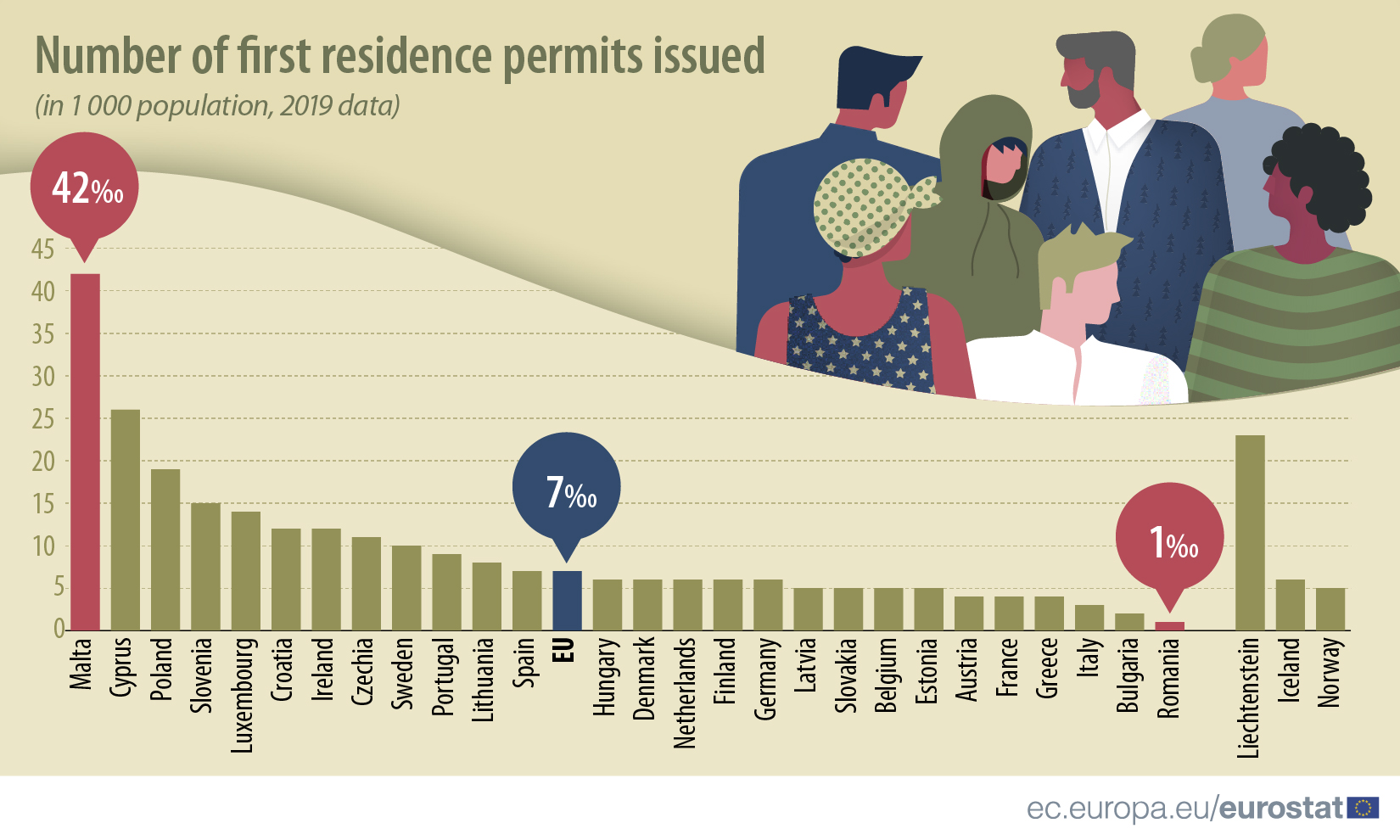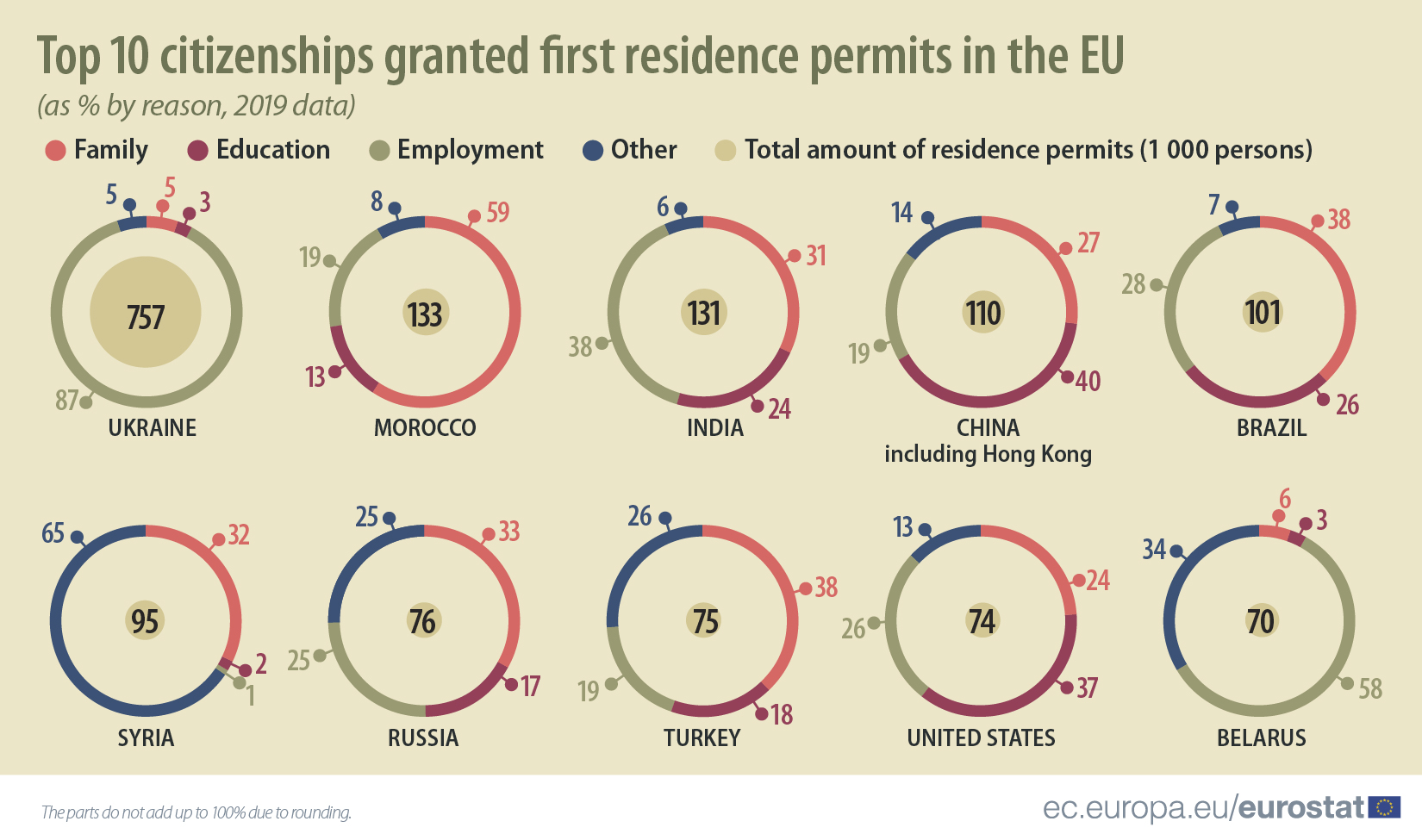In 2019, about 3.0 million first residence permits were issued in the EU to non-EU citizens. The number rose by 6% (or 163 000) compared with 2018, continuing the upward trend observed since 2013. The year-over-year increase in the total number of first residence permits was mainly driven by the increasing number of first permits issued for employment reasons (up by 214 000, or 22%).
Employment-related reasons accounted for 41% of all first residence permits issued in the EU in 2019, family reasons for 27%, education reasons for 14%, while other reasons, including international protection, accounted for 18%.
Highest number of first residence permits relative to the population in Malta, Cyprus and Poland
In 2019, Poland issued a quarter of all first residence permits granted in the EU to non-EU citizens (724 000, or 25% of total permits issued in the EU), followed by Germany (460 000, or 16%), Spain (320 000, or 11%), France (285 000, or 10%), Italy (176 000, or 6%) and Czechia (117 000, or 4%). Compared with the population of each Member State, the highest rate of first permits issued in 2019 was recorded in Malta (42 permits issued per 1000 population), ahead of Cyprus (26), Poland (19), Slovenia (15) and Luxembourg (14). For the EU as a whole in 2019, seven first residence permits were issued per 1000 population.
Source dataset: migr_resfirst
Poland for work, France for study
Poland topped the list of employment-related first residence permits, with 625 000 permits issued in 2019 (of which 551 000 were issued to Ukrainians), making up 52% of all first permits for employment reasons issued in the EU. France issued the most education-related permits (90 000 permits, or 23%), ahead of Germany (61 000, or 15%). The Member States with the highest number of permits issued for family reasons in 2019 were Germany (167 000, or 21%), Spain (144 000, or 18%), Italy and France (respectively 101 000 and 98 000, or 12% each). Germany was also the top country in the EU for other reasons with 166 000 permits (30%) issued in 2019, of which the majority were for refugee status and subsidiary protection (90 000) and protection for humanitarian reasons (43 000).
Over one third of residence permits issued to citizens of Ukraine, Morocco and India
757 000 Ukrainians received first residence permits in the EU Member States in 2019, making them the largest citizenship group among all recipients. Almost four out of five of these permits were issued by Poland. Citizens of Morocco (133 000 permits, of which 47% were issued in Spain) and India (131 000, of which 19% in Germany) followed. Citizens of these countries accounted for over one-third (35%) of all first residence permits issued in 2019. Among the top 10 citizenships granted permits in the EU in 2019, employment was the main reason for permits issued to Ukrainians, accounting for 87% of all first residence permits issued to Ukrainians in 2019, and Belarusians (58%). Family was the prevailing reason for permits granted to Moroccans (59%), and education for permits issued to Chinese (40%) and citizens of the United States (37%). Other reasons, namely refugee status and subsidiary protection, were predominant for Syrians (65%).
Source dataset: migr_resfirst
For more information please see the Statistics Explained article on First residence permits issued and the interactive infographic.
Note: The European Union (EU) includes 27 EU Member States. The United Kingdom left the European Union on 31 January 2020. Further information is published here.
To contact us, please visit our User Support page.
For press queries, please contact our Media Support.



